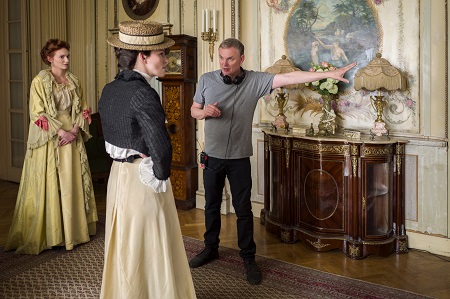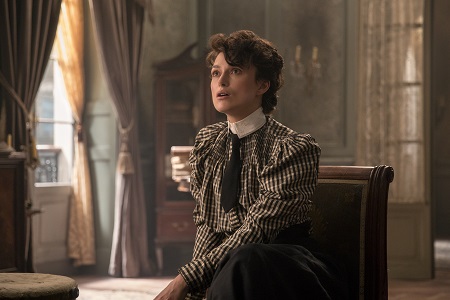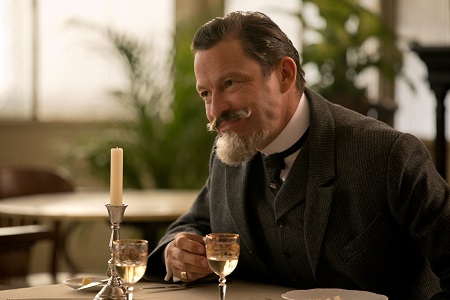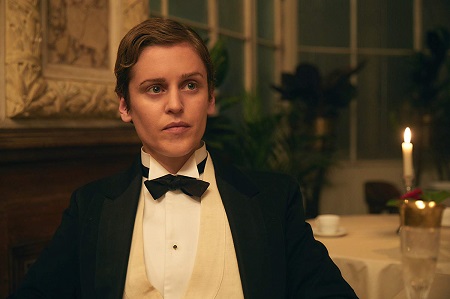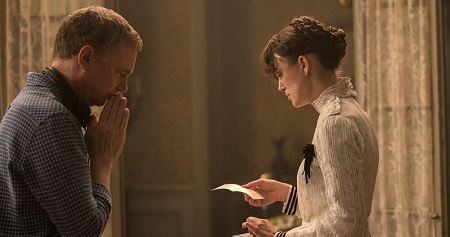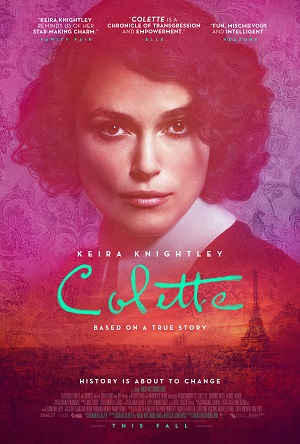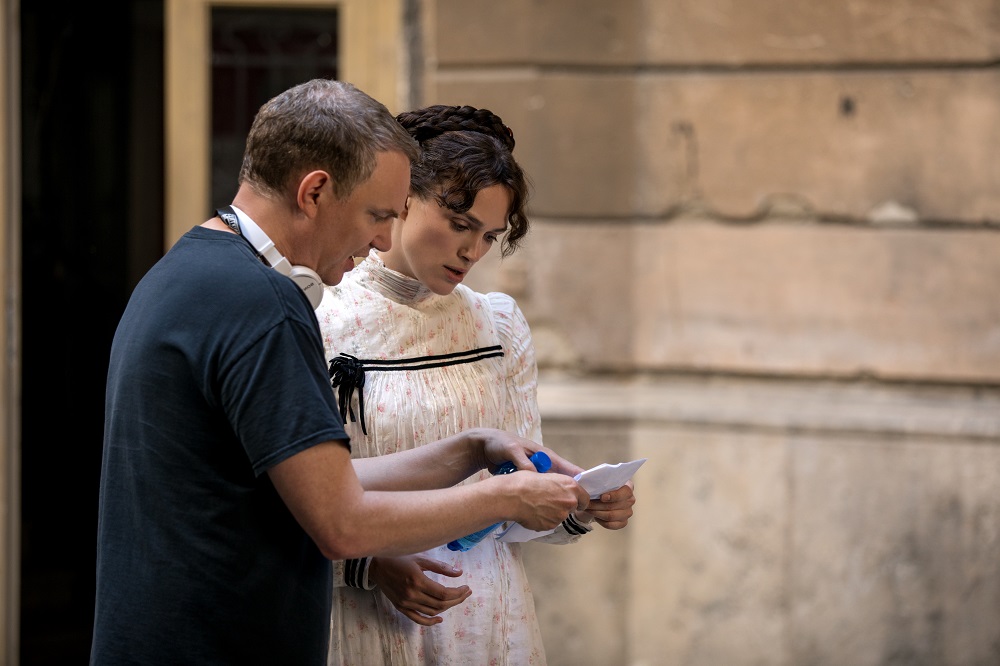
“Colette” – Interview with Wash Westmoreland
by Sara Michelle Fetters - October 3rd, 2018 - Interviews
“An Inspiration for Today”
Director Wash Westmoreland’s chats about bringing his biographical drama Colette to life
The first major interview of my career was speaking to directors Wash Westmoreland and Richard Glatzer way back in 2006. The pair’s sophomore drama Quinceañera had just made its local debut during the Seattle International Film Festival, and the two directors and I had been shuffled into a hospitality suite for visiting talent when the conference room we were originally supposed to be chatting in at the W Hotel suddenly became unavailable. What initially was supposed to be a quick 15 minute Q&A suddenly turned into an hour-long conversation, the three of us sitting on a couch near a window overlooking the city as we discussed a wide variety of topics, not all of them relating to their superlative motion picture.
It was an extraordinary act of kindness. At least, that’s what it felt like to me as relatively young journalist still in the early days of her transition and not at all secure about speaking with people she didn’t know in a public setting, especially individuals she was supposed to be interviewing. But Westmoreland and Glatzer were beyond giving with their time, our easygoing back-and-forth one of the more spectacular memories of my entire career and it goes without saying it is a moment I shall never forget.
“I remember that!” exclaims Westmoreland as we began our brief phone interview to talk about his latest directorial outing, the divine biographical drama Colette. “I’m so glad you got to meet Richard. He was such a big part of Colette. It was a project that meant so much to him. I’m glad you knew him. That you met him. That means a lot.”
Glatzer was more than just Westmoreland’s creative partner. He was also his husband. The two made a small handful of films together including LGBTQ favorite The Fluffer, the Errol Flynn drama The Last of Robin Hood and the movie that won Julianne Moore an Oscar for Best Actress, 2014’s Still Alice. Glatzer died in March of 2015 of ALS, making Colette Westmoreland’s first trip back behind the camera since his husband’s tragic passing.
The story of French literary titan Sidonie-Gabrielle Colette, the movie focuses on roughly 15 years of the artist’s life, most notably on her marriage to author, poet and showman Henri Gauthier-Villars, known throughout Paris as the one and only “Willy.” As portrayed by Keira Knightley and Dominic West, this pair engages in a multifaceted back-and-forth that deftly explores sex, gender and artistic expression in ways that feel intimately current. Colette was a force of nature well ahead of her time, her battles to take charge of her literary career nearly as incredible as her unapologetic enthusiasm to express her sexual urges outside of perceived societal norms.
Featuring a stunning performance from Knightley ranking as one of her best and an intelligent, niftily lissom script written by Glatzer, Westmoreland and Ida scribe Rebecca Lenkiewicz, Colette is an exquisite drama that I adored. More than that, though, the thing I think I loved most about the film is the way it so freely embraced its subject’s views on life, love, literature and artistic expression. It is a feature that thinks outside of the box in an imaginative variety of ways, the majority of its key themes and ideas refreshingly current.
These were just a few of the topics of conversation as Westmoreland and I reconnected for the first time since May of 2006. Heck, one moment near the end of our interview had me feeling particularly unprofessional, the director’s answer to one of my questions regarding Transgender representation in modern cinema having me unsuccessfully attempting to choke back a few tears.
Sara Michelle Fetters: If you could talk to me a little bit about what you think it was that drew Richard to Colette’s stories back in, what was it? 1998? 1999? What got you both so excited in telling her story?
Wash Westmoreland: Richard was an avid reader and he was also a huge fan of strong female characters. He started reading both biographies and novels by Colette and was just like, there’s a film here. She’s extraordinary. There’s something about the way she lived that just, you know, makes your jaw drop open even a hundred years later. [Richard] really saw that there was this great story in the first marriage of Colette and Willy. That you have this natural narrative of someone who’s incredibly talented being kept down by another person who’s both mentoring and exploiting her. So that was the idea at the beginning. We just both thought this will be an incredible film.
Sara Michelle Fetters: And it was a project that you both felt the need to stick with and keep working on for a very long time. Why was that?
Wash Westmoreland: You know, when you write a film in a way you sort of see it in your mind’s eye, you sort of see what the film is and what it is going to be. We both felt it would be a terrific film. We wrote it in 2001 in 10 days in isolation in the French countryside and we were like, “Oh, that was easy.” So easy it’s only taken like, you know, 16 years and probably over 15 rewrites to finally get made. [laughs] Three title changes. A couple of false starts. It was a process to get this film made.
We always worked on a variety of projects at the same time. We always had two or three scripts going. Sometimes a movie will happen, which is great. Sometimes a movie just fades away and you realize it’s never going to happen, and it’s a sad thing. You just realize it’s no longer got relevance.
But Colette just wouldn’t fade away. It became more resonant with the discussions that were happening in society as time progressed. Certainly just the timing of it coming out now, when there’s such a conversation about the Me, Too movement and the Times Up! movement, and about LGBTQ rights, it just seems bang-on the moment for the cultural conversation we’re having right now.
Sara Michelle Fetters: And that’s the crazy part watching this movie. I mean, I knew from looking at the production notes and from reading some of the other interviews that you’d given about that long, almost torturous process that existed in regards to bringing this story to the screen. Yet right now feels like the perfect time to revisiting Colette’s story. This movie had to come out now.
Wash Westmoreland: It’s the perfect time. Yes.
It’s funny. In early 2002 we’d been pitching this story and we’d say, “When you least expect it, when their marriage is kind of like going through a lot of strain, rather than going into this sort of melancholy reflective moment, Colette starts having an affair with a woman who is completely male identified and uses male pronouns.” They could be seen as a forbearer of today’s Transgender community. It was just so obvious. And people just sat there and stared. It’s like we were mad, you know?
Now, of course, because of the huge progress with Transgender visibility, mainstream audiences are actually welcoming that development within the story. That is good to see. It’s long overdue.
In a way Colette’s story was too ahead of its time for the movie to happen earlier than it did. We also had to springboard into this film from a success within our career, because it’s a bigger budget and a more demanding production. It involves a lot more of our time and resources than our earlier projects. We needed to have a film like Still Alice on our resume to be able to make a film like Colette.
But after Still Alice Richard was very ill with ALS. I still asked him what he would want to do next, and he was using a typing device at the time with his toe. He typed Colette. That’s what he wanted to do next.
He passed away a few weeks later, but I knew that when I came out of my deepest grief this would be a way to be close to him, to work on this film, and make it happen. I wanted to get his name up there [on the screen] again. I wanted to see his dialogue come out of the mouths of great actors.
Sara Michelle Fetters: I have to admit, when I saw his name pop on the screen, it made me so happy. It just made me very, very happy.
Wash Westmoreland: Thank you for saying that. It obviously means a lot to me, too.
Sara Michelle Fetters: But, talking about that dialogue. While I would never admit to being intimately familiar with Colette’s works, I’ve read Gigi and Chéri but that’s about it, the words you have coming out of the mouths of Keira Knightley and Dominic West is pretty glorious. Also, it seems to me they were both reveling in the opportunity to be able to spout it, too.
Wash Westmoreland: Oh, thank you so much! We worked hard on that, getting the dialogue right. It took a lot of effort.
Sara Michelle Fetters: It felt so organic to Colette’s world during that time period. At the same time, if you’ve read even one of her books, it was so richly comparable to what she herself wrote.
How difficult was it to get all of that right? To get the actors to be able to zing it back and forth with such richly naturalistic authenticity?
Wash Westmoreland: It started with Keira and Dominic. They just got there. There was something about Colette and Willy, the way they had of entertaining each other. They were both very strong characters with very strong minds. They had these great intellects and they played verbal tennis with each other, passing barbs back and forth. When I first rehearsed with Keira and Dominic it just sprung to live. I was like, thank you so very much! I knew right away this film was going to work because of their chemistry. They became Colette and Willy which was so essential. I couldn’t have been happier.
So many period pieces are adapted from literary sources, and many times they take the dialogue straight off the page which so often is just this rich, wonderful dialogue written by great authors. But that doesn’t necessarily reflect the way people spoke at the time. It could often be looser and more colloquial, perhaps even less articulate than what we see represented in our high literature. Also, because this was a French story that was being told in the English language, there was a need to loosen up the idiom of the language in order to kind of capture the spirit of the characters. That took some work.
Sara Michelle Fetters: You never like to say only one certain actor could only play one certain part. All the same, how difficult is it to imagine anyone but Keira playing Colette? She’s extraordinary.
Wash Westmoreland: No. I can’t.
But, to be honest, when we were originally writing the script and first trying to get it made Keira was like, what, 14-years-old? Obviously, if it had been then someone would else would have had to portray Colette, so that goes back to how this truly was just the right time for us to make this film. So there were many Colettes. I don’t want to name names but we had a number of actresses we were initially considering. There were plenty of women we initially thought would be the perfect Colette.
When we saw Pride and Prejudice, and Keira was only like 21 at the time, we were both struck by her unbelievable performance. When she rips Mr. Darcy a new one we were like, wow, she’s got something very Colette about her. But she still seemed on the young side. It was only after Still Alice and started asking once again who the perfect person was to be playing Colette. Keira was just the natural candidate. She’s so electric, so charismatic. She’s so smart. She has a sensuality and a dry wit. She read the script and connected to it, and I think we all knew it was exactly the right match of actress and role.
Sara Michelle Fetters: I love that when you watch Keira in this, you can in a way see how she has evolved from role to role. Not just from Pride and Prejudice to now, but also in films like Atonement, The Duchess and even the Pirates of the Caribbean adventures. It’s like all of those performances have given her the wherewithal to fully inhabit this character to the point she practically disappears inside of her.
Wash Westmoreland: Thank you for saying that. She’s amazing, and Keira goes through an incredible transformation going form 19-years-old at the beginning to 34 at the end. You see her growing into her own skin.
We worked a lot on how to create that effect because, obviously, we shot the film out of sequence. We had seven phases of Colette. We would map it all it and it would be about body language, about her voice. It would be about costume and hair and the makeup. But mainly it was about the energy that Keira was bringing to the character at different stages of her evolution. She starts off like a country girl, a little sort of unsure of herself in the Parisian high society, but by the end she’s just completely knows who she is. She has this tremendous power from this sort of self-realization. She just speaks her truth loud and clear.
Sara Michelle Fetters: And there’s Dominic. You could easily have portrayed Willy as a monster, because so much of what he says and does is kind of monstrous. But you all depict him as this real, authentically complex figure, and by the time the film comes to an end you kind of care about him in some ways. A lesser film and a less confident actor wouldn’t have done that. They’d have let Willy be a monster and leave it at that.
Wash Westmoreland: It’s so weird, but a lot of men, powerful men who behave badly, they don’t appear like Lord Satan. They’re actually very charming; they’re seductive and funny to be around. They are the life and soul of the party, and they use all those weapons to get their selfish needs met.
That was very much who Willy was. He was an extraordinary character. His relationship with Colette was very complex. He was her mentor, but he was also an exploiter. She says at the end of her life she would never have become a writer without Willy. But at the same time she would never have become a great writer until she left him. The movie had to show what was good about their relationship as well as what was bad and how difficult it was for Colette to break away. The hold he had over her wasn’t just economic and cultural, it was emotional, psychological and sexual. He had a lot of weapons in his armory to keep her down.
Sara Michelle Fetters: I also love the fact that you guys just focus on this portion of Colette’s life, these formative years and this relationship between her and Willy. You very easily could have extended things out and we could have seen her great successes with Gigi and all those other books and this movie easily could have become overly cluttered and unfocused. Either that or it would have been about five hours long.
Wash Westmoreland: Yeah. We would have needed multiple seasons on HBO to get through all of that. [laughs]
Colette had this rich, complicated life. She lived fully. She had so much going on. It’s incredible! She became a journalist. She became a movie reviewer. She flew in airplanes when they’d just been invented. She has affairs left and right. She was just living large all her life, and it was all going into her writing, it fed directly into her process.
But while there’s a lot happening in Colette’s life this section of it really appealed to us because it was like the birth of her as an artist. It was her genesis.
Sara Michelle Fetters: as a Trans woman, I love that you talk up how this movie deals so much with gender, gender identity and gender politics. And to think, we’re talking about them in the context of a story that happened at the turn of the 20th century.
Wash Westmoreland: Thank you so much for saying that. I think, what is particularly interesting in that respect is that Missy was someone who was very much adopting masculinity as a way of reaching his authentic self. He can be seen as a forerunner of today’s Trans Community, although it’s hard sometimes to say that because it’s such a modern self-definition to give that designation to someone who during their time wasn’t even aware of the word “Transgender” or the prospect of a “Trans Community.”
In a way, it’s almost like seeing the origins of that identity, of those concepts. The words gay, lesbian and bisexual were also not commonly used around that time as well. It’s kind of like that as well as telephones, motor cars and cinema being invented, it was also a time when new sort of ideas around sexuality were flourishing and people were really starting to explore gender. They were exploring their own sexual desires in very profound ways.
Colette was one of the first people who was really at the forefront of exploring her desires and writing honestly about them. This inspired a whole generation of readers to think differently about their own lives.
Sara Michelle Fetters: I know we’re running out of time, but I have two questions to finish with, and the first one is a little bit selfish.
Wash Westmoreland: Ask away.
Sara Michelle Fetters: With the kerfuffle that happened with Scarlett Johansson, I love that you have Jake Graf and Rebecca Root in this movie just quietly playing cisgender characters. I think that’s extraordinary. Did any of the conversations regarding Trans actors playing Trans roles ever cross your mind while you were casting? Or was it just the case that they were the best actors to play these roles?
Wash Westmoreland: As far as casting goes, when I was considering how to cast Missy I had a Transgender consultant, Christine Clark, who is this incredible documentarian whose been working for 30 years making work about gender and sexuality. We sort of got into a lot of the issues together about Missy. As part of that process, because Missy had the body of a cisgender woman but something in his mind was reaching towards masculine identity, there were a lot of very complex issues around the casting of Missy.
We went to a Transgender actor’s workshop and I just listened. So many of the actors that were saying, “We want to tell our stories, but we also want the freedom to act in cisgender roles and to explore characters that are not Trans.” This light bulb went off in my mind. There were so many talented actors there! I had to explore that more.
And then I met Jake, and he’s just is such an incredible actor, exactly the right personality to sit in with the whole kind of world we were creating. Super smart. Super educated. Speaks French. He had this very intuitive feeling for that character. And then also there was Rebecca Root, who’s also appearing in the Jacques Audiard movie The Sisters Brothers, playing a cisgender character. She’s just an extraordinary talent and I loved working with her.
So I just feel like there is this quiet revolution that happens while you’re watching the movie because most of the audience isn’t aware. They don’t know who Jake and Rebecca are. They’re unfamiliar with their backgrounds. By the time people do become aware, the case has already been proven. It’s completely successful. Of course, it’s just attributable to their talent. With the emerging generation of Trans actors I think we’re going to see this happening more and more. But I would also think Colette would be very happy that I got to work with such an inclusive cast on Colette.
Sara Michelle Fetters: And finally, at the end of the day, what do you want people talking about when they exit the theatre?
Wash Westmoreland: I feel like Colette was someone who kind of had this unstoppable life force. Anytime she came up against a barrier she’d find a way of breaking through it. I feel most of us have things in our lives that we have to face, we have situations where you are frightened or that are frustratingly difficult. Definitely the process of coming out for a lot of LGBTQ people can be hard, so can be making honest claims about who you are as a person.
Colette was very much about all that. She wasn’t about what society thought you were, she was about who she felt, who she knew, she was. She declared her voice loud and proud, and that’s why I think she’s an inspiration for today.
– Interview reprinted courtesy of the SGN in Seattle
